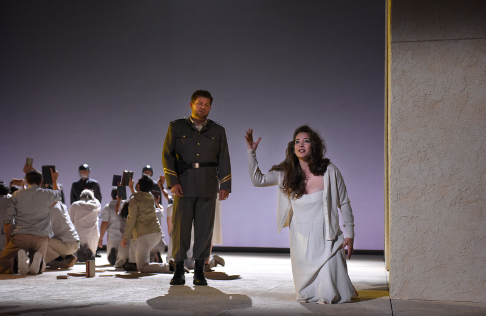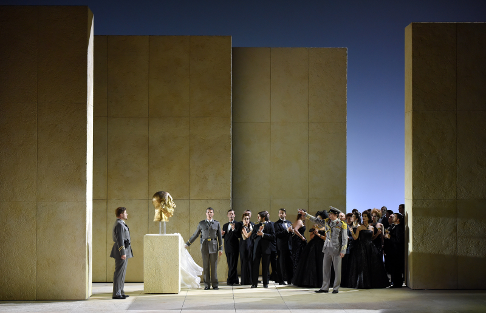![Scene from Theodora [Photo courtesy of Théâtre des Champs-Élysées]](http://www.operatoday.com/20151001-19VP.png)
21 Oct 2015
Theodora, Théâtre des Champs-Élysées
Handel’s genius is central focus to the new staging of Handel’s oratorio Theodora at Paris' Théâtre des Champs-Élysées.
English Touring Opera are delighted to announce a season of lyric monodramas to tour nationally from October to December. The season features music for solo singer and piano by Argento, Britten, Tippett and Shostakovich with a bold and inventive approach to making opera during social distancing.
This tenth of ten Live from London concerts was in fact a recorded live performance from California. It was no less enjoyable for that, and it was also uplifting to learn that this wasn’t in fact the ‘last’ LfL event that we will be able to enjoy, courtesy of VOCES8 and their fellow vocal ensembles (more below …).
Ever since Wigmore Hall announced their superb series of autumn concerts, all streamed live and available free of charge, I’d been looking forward to this song recital by Ian Bostridge and Imogen Cooper.
Although Stile Antico’s programme article for their Live from London recital introduced their selection from the many treasures of the English Renaissance in the context of the theological debates and upheavals of the Tudor and Elizabethan years, their performance was more evocative of private chamber music than of public liturgy.
Evidently, face masks don’t stifle appreciative “Bravo!”s. And, reducing audience numbers doesn’t lower the volume of such acclamations. For, the audience at Wigmore Hall gave soprano Elizabeth Llewellyn and pianist Simon Lepper a greatly deserved warm reception and hearty response following this lunchtime recital of late-Romantic song.
For this week’s Live from London vocal recital we moved from the home of VOCES8, St Anne and St Agnes in the City of London, to Kings Place, where The Sixteen - who have been associate artists at the venue for some time - presented a programme of music and words bound together by the theme of ‘reflection’.
'Such is your divine Disposation that both you excellently understand, and royally entertaine the Exercise of Musicke.’
‘And there was war in heaven: Michael and his angels fought against the dragon; and the dragon fought and his angels, And prevailed not; neither was their place found any more in heaven … that old serpent … Satan, which deceiveth the whole world: he was cast out into the earth, and his angels were cast out with him.’
There was never any doubt that the fifth of the twelve Met Stars Live in Concert broadcasts was going to be a palpably intense and vivid event, as well as a musically stunning and theatrically enervating experience.
‘Love’ was the theme for this Live from London performance by Apollo5. Given the complexity and diversity of that human emotion, and Apollo5’s reputation for versatility and diverse repertoire, ranging from Renaissance choral music to jazz, from contemporary classical works to popular song, it was no surprise that their programme spanned 500 years and several musical styles.
The Academy of St Martin in the Fields have titled their autumn series of eight concerts - which are taking place at 5pm and 7.30pm on two Saturdays each month at their home venue in Trafalgar Square, and being filmed for streaming the following Thursday - ‘re:connect’.
The London Symphony Orchestra opened their Autumn 2020 season with a homage to Oliver Knussen, who died at the age of 66 in July 2018. The programme traced a national musical lineage through the twentieth century, from Britten to Knussen, on to Mark-Anthony Turnage, and entwining the LSO and Rattle too.
With the Live from London digital vocal festival entering the second half of the series, the festival’s host, VOCES8, returned to their home at St Annes and St Agnes in the City of London to present a sequence of ‘Choral Dances’ - vocal music inspired by dance, embracing diverse genres from the Renaissance madrigal to swing jazz.
Just a few unison string wriggles from the opening of Mozart’s overture to Le nozze di Figaro are enough to make any opera-lover perch on the edge of their seat, in excited anticipation of the drama in music to come, so there could be no other curtain-raiser for this Gala Concert at the Royal Opera House, the latest instalment from ‘their House’ to ‘our houses’.
"Before the ending of the day, creator of all things, we pray that, with your accustomed mercy, you may watch over us."
The doors at The Metropolitan Opera will not open to live audiences until 2021 at the earliest, and the likelihood of normal operatic life resuming in cities around the world looks but a distant dream at present. But, while we may not be invited from our homes into the opera house for some time yet, with its free daily screenings of past productions and its pay-per-view Met Stars Live in Concert series, the Met continues to bring opera into our homes.
Music-making at this year’s Grange Festival Opera may have fallen silent in June and July, but the country house and extensive grounds of The Grange provided an ideal setting for a weekend of twelve specially conceived ‘promenade’ performances encompassing music and dance.
There’s a “slide of harmony” and “all the bones leave your body at that moment and you collapse to the floor, it’s so extraordinary.”
“Music for a while, shall all your cares beguile.”
The hum of bees rising from myriad scented blooms; gentle strains of birdsong; the cheerful chatter of picnickers beside a still lake; decorous thwacks of leather on willow; song and music floating through the warm evening air.
![Scene from Theodora [Photo courtesy of Théâtre des Champs-Élysées]](http://www.operatoday.com/20151001-19VP.png)
Handel’s genius is central focus to the new staging of Handel’s oratorio Theodora at Paris' Théâtre des Champs-Élysées.
Opening October 10th, it features striking performances by acclaimed baroque specialist William Christie and his Les Arts Florissants and super-star counter-tenor Philippe Jaroussky, Handel certainly is worthy of this prime-time treatment and it is already a highlight of the new season.
With the coming holidays, Americans can hear Handel's Messiah almost everywhere: in concert halls, churches, shopping malls and even elevators. In my youth, I assumed he was a one-hit composer (well, two counting Water Music). I knew he had a long life and continued to compose until the end but always assumed that the "powers that be" knew that his other works deserved no particular attention.

In recent decades, however, this has changed for me and many others. Imaginative stagings and the Baroque revival, featuring music played on historically-informed instruments, have given new life Handel's many operas and oratorios and also revived interest in a large number of other long-forgotten composers. William Christie and his forces have already successfully staged this oratorio in Glyndebourne in 1996 with a popular and provocative staging by Peter Sellars. Christie recorded the work in 2000 and now opens the Théâtre des Champs-Élysées season with it. The oratorio tells the story with such detail that the border between opera and oratorio seems to have disappeared. The new production, also “modern dress,” focuses on the cast and chorus to clarify and ennoble the music of this tragic tale.
The British stage director Stephen Landridge, the new director of the opera of Göteborg, tells the story of Handel’s penultimate oratorio with a refreshing directness and clarity. Movable walls, which change color from the lighting, frame the action and the choir, often onstage, represent the public. The story of Roman legions moving against a Christian community in ancient Antioch features a young centurion who falls in love with a chaste, newly-converted Christian. When Roman forces move against the upstart “sect,” the conflicting emotions of the young officer, Dydime, sang with poise and arching beauty by Philippe Jaroussky, become central to the story.

In the title role, soprano Katherine Watson began appearing in public as part of Christie’s Jardin des Voix program for young singers in 2008 and, after appearing in several productions under his wing, is ready for the international stage. A voice which combines strength and shape, her Theodora has serious dramatic impact and beauty. Her friend and confident, Irène, sung by Stéphanie d’Oustrac, is also carefully realized and beautifully sung. d’Oustrac also began her career with Christie and now has a serious international career. A vibrant artist of sound, her performance compliments Watson’s engaging Theodora.
The Roman officer who tries to save Theodora, Didymus, was sung by the celebrated counter-tenor Philippe Jaroussky. While the voice seemed to have a bit less impact that in the past in this same theater, it retains the superb grace and beauty which took him to the top. This and his instinctive theatrical sense make him appealing as the Roman officer who questions the authoritarian state. As Valens, the Roman commander demanding obedience, bass Callum Thorpe performs with much barking and an often-distorted melodic line but the audience seemed to like his portrayal. Tenor Kresimir Spicer is more engaging as Didymus’ friend, Septime. One little complaint would be that the English text could have been more accurately expressed by the entire cast.
It is a tribute to William Christie’s decades of work in France that a Handel opera can open a season with five performances and have capacity audiences cheering. Some time ago there was an internet discussion of whether Handel should be considered at the level of Beethoven, Bach or Mozart, the top ranking of the pantheon of classical composers. The overarching beauty and brilliance of Theodora and its message of universal love and hope makes the case that Handel’s music for voice is a universal treasure that all music-lovers should well know.
Frank Cadenhead